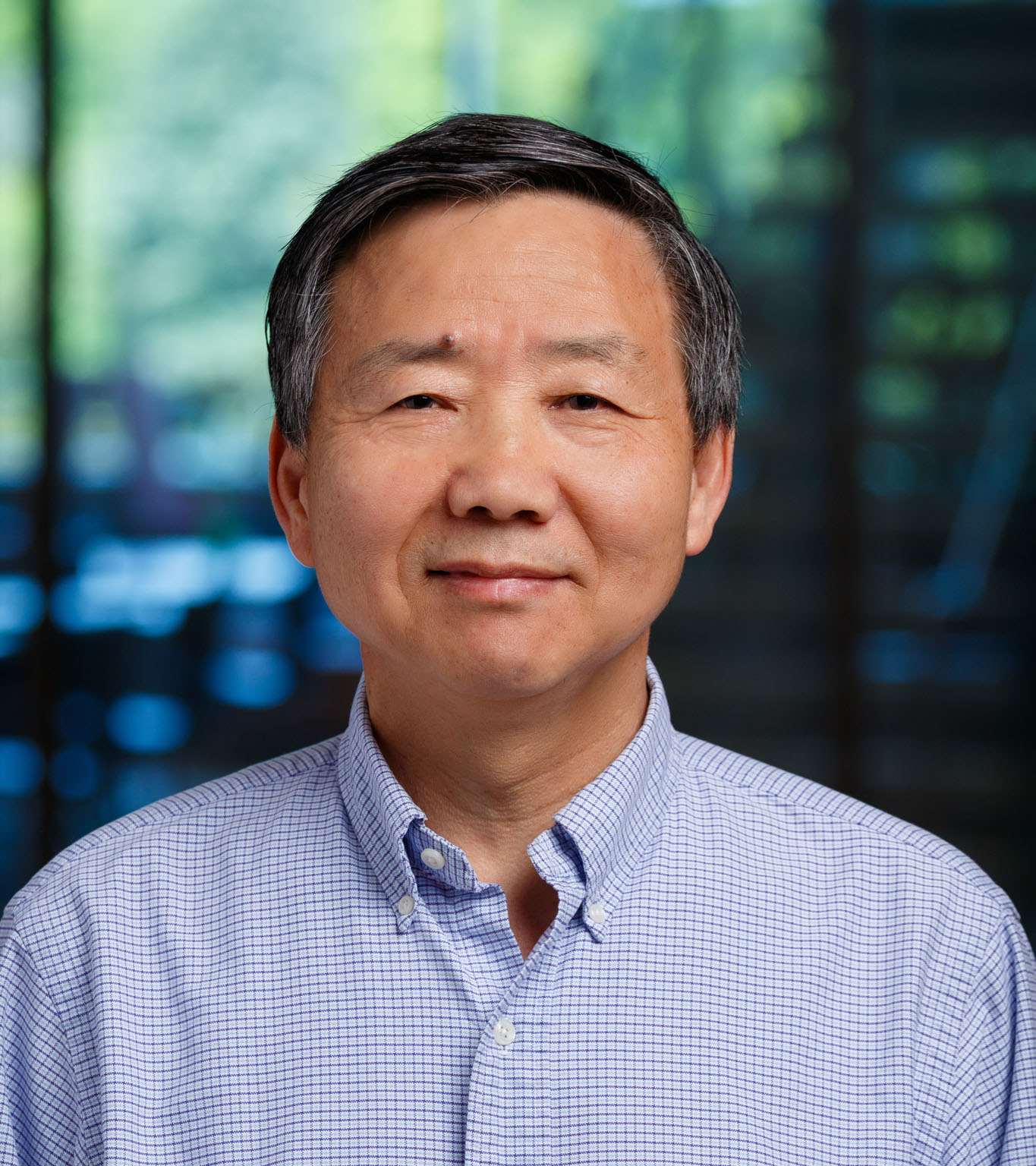
Guan Chen, MD, PhD
Professor
Contact Information
General Interests
Education
1985, Sun Yat-Sen University, MS
1990, University of Heidelberg, Germany, PhD
Research Experience
- p38gamma MAPK, Cancer Signaling, Ras Oncogenesis, Nuclear Receptors, Targeted Cancer Therapy
Research Interests
Cancer remains a life-threatening disease and there is an urgent need to identify novel molecular targets for therapeutic intervention. Our lab focuses on investigating oncogenic activity of p38gamma in colon, breast and pancreatic cancers. In colon cancer, p38gamma is required for K-Ras induced transformation and for K-Ras-dependent malignant growth through mechanisms involving collaboration with its phosphatase PTPH1, stimulating c-Jun/AP-1-dependent MMP9 transcription, and/or phosphorylating and activating Hsp90. p38gamma activation also causes increased EGFR transcription via -c-Jun and decreased EGFR phosphorylation via PTPH1, resulting in accumulation of non-phosphorylated EGFR and resistance to tyrosine kinase inhibitors. In breast cancer, p38gamma-overexpression alone induces malignant transformation in human mammary epithelial cells leading to a phenotype resembling triple-negative breast cancer (TNBC). p38gamma also promotes TNBC growth and metastasis by stimulating cancer-like stem cell (CSC) expansion. Moreover, p38gamma phosphorylates estrogen receptor alpha (ER) and DNA Topoisomerase II alpha, likely further contributing to TNBC phenotype. Importantly, the p38gamma pharmacological inhibitor pirfenidone (PFD) suppresses xenograft growth of K-Ras-mutated colon cancer and TNBC in nude mice. These results together indicate that p38gamma is an important therapeutic target in K-Ras mutated colon cancer and in TNBC.
We recently further investigated roles of p38gamma in tumorigenesis in genetic mouse models of colon and breast cancers. Conditional knockout (KO) of p38gamma from intestinal epithelial cells suppresses AOM/DSS-induced colon cancer and inhibits beta-catenin/Wnt pathways and systemic application of PFD shows similar effects in wild-type, but not in p38gamma KO, mice. Further, conditional p38gamma KO from mammary epithelial cells inhibits breast cancer development in a PyMT mouse model. Currently, we are studying effects of p38gamma KO on mouse pancreatic cancer development in a KPC mouse model. Because p38gamma activates several key molecules in glycolysis, we will in future exploit if p38gamma is a master activator of aerobic glycolysis, a hallmark of cancer, and thereby promotes cancer development and growth by activating metabolic reprogramming.
Visit Dr. Chen's Faculty Collaborative Database profile for additional information.
Publications
-
Correction: p38γ MAPK Is Essential for Aerobic Glycolysis and Pancreatic Tumorigenesis.
(Wang F, Qi XM, Wertz R, Mortensen M, Hagen C, Evans J, Sheinin Y, James M, Liu P, Tsai S, Thomas J, Mackinnon A, Dwinell M, Myers CR, Bach RB, Fu L, Chen G.) Cancer Res. 2025 Feb 17;85(4):825 PMID: 39957350 SCOPUS ID: 2-s2.0-85219159907 02/17/2025
-
(Qi X, Wang F, Thomas L, Ma S, Palen K, Lu Y, Sheinin Y, Gershan J, Fu L, Chen G.) Am J Cancer Res. 2024;14(12):5734-5751 PMID: 39803648 PMCID: PMC11711543 01/13/2025
-
p38γ MAPK Inflammatory and Metabolic Signaling in Physiology and Disease.
(Qi XM, Chen G.) Cells. 2023 Jun 21;12(13) PMID: 37443708 PMCID: PMC10341180 SCOPUS ID: 2-s2.0-85164737685 07/14/2023
-
(Qin JZ, Xin H, Qi XM, Chen G.) Front Biosci (Landmark Ed). 2022 Jan 18;27(1):31 PMID: 35090336 SCOPUS ID: 2-s2.0-85124820704 01/30/2022
-
p38γ MAPK Is Essential for Aerobic Glycolysis and Pancreatic Tumorigenesis.
(Wang F, Qi XM, Wertz R, Mortensen M, Hagen C, Evans J, Sheinin Y, James M, Liu P, Tsai S, Thomas J, Mackinnon A, Dwinell M, Myers CR, Bartrons Bach R, Fu L, Chen G.) Cancer Res. 2020 Aug 15;80(16):3251-3264 PMID: 32580961 PMCID: PMC9358694 SCOPUS ID: 2-s2.0-85089787021 06/26/2020
-
p38gamma MAPK Is Essential for Aerobic Glycolysis and Pancreatic Tumorigenesis
(Fang Wang, Xiao-Mei Qi, Ryan Wertz, Matthew Mortensen, Catherine Hagen, John Evans, Yuri Sheinin, Michael James, Pengyuan Liu, Susan Tsai, James Thomas, Alexander Mackinnon, Michael Dwinell, Charles R Myers, Ramon Bartrons, Liwu Fu, Guan Chen.) Cancer Research. Wang F, Qi XM, Wertz R, et al. p38gamma MAPK is essential for aerobic glycolysis and pancreatic tumorigenesis [published online ahead of print, 2020 Jun 24]. Cancer Res. 2020;canres.3281.2019. doi:10.1158/0008-5472.CAN-19-3281 06/24/2020
-
Targeting an oncogenic kinase/phosphatase signaling network for cancer therapy.
(Qi XM, Wang F, Mortensen M, Wertz R, Chen G.) Acta Pharm Sin B. 2018 Jul;8(4):511-517 PMID: 30109176 PMCID: PMC6089844 SCOPUS ID: 2-s2.0-85048878016 08/16/2018
-
Editorial Preface for Targeted Cancer Therapy.
(Chen G, Li W.) Acta Pharm Sin B. 2018 Jul;8(4):501-502 PMID: 30109174 PMCID: PMC6090083 08/16/2018
-
Editorial Preface for Targeted Cancer Therapy
(Chen G, Li W.) Acta Pharmaceutica Sinica B. July 2018;8(4):501-502 SCOPUS ID: 2-s2.0-85050349538 07/01/2018
-
(Yin N, Lepp A, Ji Y, Mortensen M, Hou S, Qi XM, Myers CR, Chen G.) J Biol Chem. 2017 Sep 08;292(36):15070-15079 PMID: 28739874 PMCID: PMC5592682 SCOPUS ID: 2-s2.0-85029228747 07/26/2017
-
(Qi X, Yin N, Ma S, Lepp A, Tang J, Jing W, Johnson B, Dwinell MB, Chitambar CR, Chen G.) Stem Cells. 2015 Sep;33(9):2738-47 PMID: 26077647 PMCID: PMC4792188 SCOPUS ID: 2-s2.0-84940467357 06/17/2015
-
(Ma S, Yin N, Qi X, Pfister SL, Zhang MJ, Ma R, Chen G.) Oncotarget. 2015 May 30;6(15):13320-33 PMID: 26079946 PMCID: PMC4537017 SCOPUS ID: 2-s2.0-84931073824 06/17/2015

